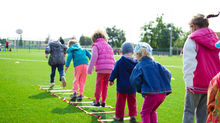Active School Lessons Can Improve your Child's Learning & Behaviour
- Hayley
- Jan 26, 2018
- 2 min read

On average, 70% of a child’s learning time is spent sitting down – that’s known as the ‘norm’ – but how much is it actually affecting not only their health, but their learning?
Not only do children spend most of the time sitting down, they also spend, on average, around 6.5 hours of their day looking at screens, whether that be a phone, computer or interactive whiteboard. This average has almost doubled in the last 20 years and has
had detrimental effects on children's learning as studies have found that their cognitive development is two years down on what it was 30 years ago. This is because children have lost both concrete thinking (literal thinking - focused on the physical world) and abstract thinking (involves a mental process - ability to think about objects, principles etc., that aren’t physically present).
Sitting down and staring at screens for most of the day doesn’t exactly sound like a great way to learn, especially as 1 in 3 children are already overweight or obese when leaving primary school. Of course, schools have PE lessons, but the benefits of being active don’t just happen, as not all children enjoy taking part or enjoy it. The best way to get children involved is by devising physical activity programmes that are carefully planned and delivered to fit their needs – such as Fit4Schools.
Research has now shown how physical activity links to improvements in achievement and can boost classroom performance, partly because physical activity improves brain function. Fit4Schools is a specialised sports company who provide a range of services and health and fitness initiatives to encourage children to engage and participate in physical activity. They have also stated that morning fitness sessions and short bursts of physical activity throughout the day can energise students, boost engagement in classes, and improve concentration.
Not only does physical activity have academic benefits, it can also improve behaviour. A 2014 survey conducted by the Youth Sport Trust, found that 70% of schools feel sport
makes a positive impact to behaviour and truancy. Studies have also shown that physical activity can make children feel more wanted and included, increase the sense of connection with their school, and improve the way that they work together in groups.
In the end, not only will daily physical activity benefit a child’s learning and behaviour, they will also be fit, healthier and happier in the process.
























